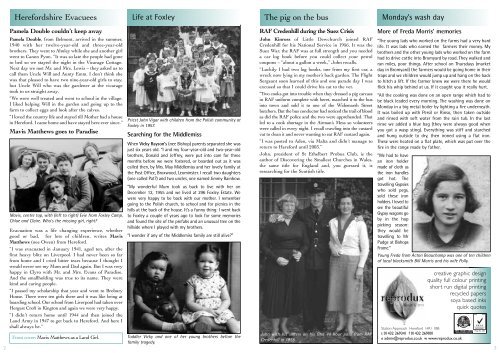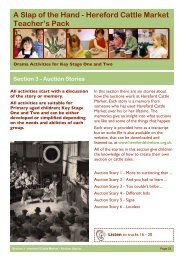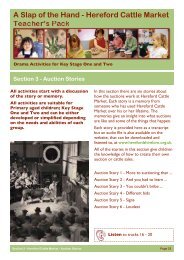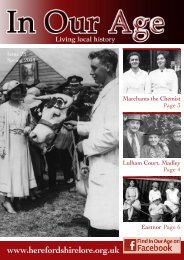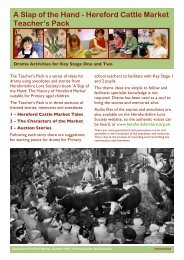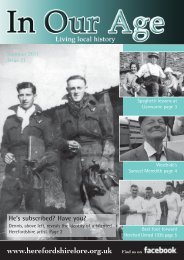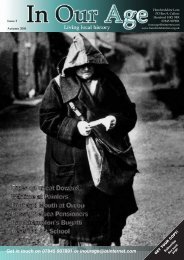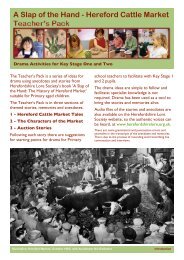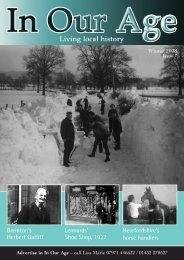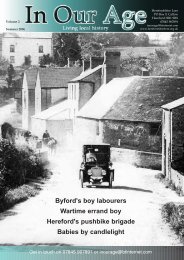Issue 12 - Herefordshire Lore
Issue 12 - Herefordshire Lore
Issue 12 - Herefordshire Lore
You also want an ePaper? Increase the reach of your titles
YUMPU automatically turns print PDFs into web optimized ePapers that Google loves.
<strong>Herefordshire</strong> Evacuees<br />
Life at Foxley<br />
The pig on the bus<br />
Monday’s wash day<br />
2<br />
Pamela Double couldn’t keep away<br />
Pamela Double, from Belmont, arrived in the summer,<br />
1940 with her twelve-year-old and three-year-old<br />
brothers. They went to Almley while she and another girl<br />
went to Canon Pyon. “It was so late the people had gone<br />
to bed so we stayed the night in the Vicarage Cottage.<br />
Next day we met Mr. and Mrs. Lewis – they asked us to<br />
call them Uncle Will and Aunty Emm. I don’t think she<br />
was that pleased to have two nine-year-old girls to stay,<br />
but Uncle Will who was the gardener at the vicarage<br />
took to us straight away.<br />
“We were well treated and went to school in the village.<br />
I liked helping Will in the garden and going up to the<br />
farm to collect eggs and look after the calves.<br />
“I loved the country life and stayed till Mother had a house<br />
in Hereford. I came home and have stayed here ever since.”<br />
Mavis Matthews goes to Paradise<br />
Mavis, centre top, with (left to right) Evie from Foxley Camp,<br />
Chloe and Claire. Who’s the missing girl, right?<br />
Evacuation was a life changing experience, whether<br />
good or bad, for lots of children, writes Mavis<br />
Matthews (nee Owen) from Hereford.<br />
“I was evacuated in January 1941, aged ten, after the<br />
first heavy blitz on Liverpool. I had never been so far<br />
from home and I cried bitter tears because I thought I<br />
would never see my Mum and Dad again. But I was very<br />
happy in Clyro with Mr. and Mrs. Evans of Paradise.<br />
And the smallholding was true to its name. They were<br />
kind and caring people.<br />
“I passed my scholarship that year and went to Brobury<br />
House. There were ten girls there and it was like being at<br />
boarding school. Our school from Liverpool had taken over<br />
Hergest Croft in Kington and again we were very happy.<br />
“I didn’t return home until 1944 and then joined the<br />
Land Army in 1947 to get back to Hereford. And here I<br />
shall always be.”<br />
Front cover: Mavis Matthews as a Land Girl.<br />
Priest John Vigar with children from the Polish community at<br />
Foxley in 1957.<br />
Searching for the Middlemiss<br />
When Vicky Rayson’s (nee Bishop) parents separated she was<br />
just six years old. “I and my four-year-old and two-year-old<br />
brothers, Donald and Jeffrey, were put into care for three<br />
months before we were fostered, or boarded out as it was<br />
called then, by Mrs. May Middlemiss and her lovely family at<br />
the Post Office, Broxwood, Leominster. I recall two daughters<br />
(one called Pat?) and two uncles, one named Jimmy Rainbow.<br />
“My wonderful Mum took us back to live with her on<br />
December <strong>12</strong>, 1955 and we lived at 296 Foxley Estate. We<br />
were very happy to be back with our mother. I remember<br />
going to the Polish church, to school and for picnics in the<br />
hills at the back of the house. It’s a funny thing: I went back<br />
to Foxley a couple of years ago to look for some memories<br />
and found the site of the prefabs and an unusual tree on the<br />
hillside where I played with my brothers.<br />
“I wonder if any of the Middlemiss family are still alive?”<br />
Toddler Vicky and one of her young brothers before the<br />
family tragedy.<br />
RAF Credenhill during the Suez Crisis<br />
John Kinross of Little Dewchurch joined RAF<br />
Credenhill for his National Service in 1956. It was the<br />
Suez War, the RAF was at full strength and you needed<br />
a car log book before you could collect your petrol<br />
coupons – “about a gallon a week,” John recalls.<br />
“Luckily I had two log books, one from my first car, a<br />
wreck now lying in my mother’s back garden. The Flight<br />
Sergeant soon learned of this and one parade day I was<br />
excused so that I could drive his cat to the vet.<br />
“Two cooks got into trouble when they dressed a pig carcass<br />
in RAF uniform complete with beret, marched it to the bus<br />
into town and sold it to one of the Widemarsh Street<br />
butchers. But the bus conductor had noticed the trail of blood<br />
as did the RAF police and the two were apprehended. That<br />
led to a cook shortage in the Airman’s Mess so volunteers<br />
were called in every night. I recall crawling into the custard<br />
vat to clean it and never wanting to eat RAF custard again.<br />
“I was posted to Aden, via Malta and didn’t manage to<br />
return to Hereford until 2003.”<br />
John, president of St Ethelbert Probus Club, is the<br />
author of Discovering the Smallest Churches in Wales,<br />
the same title for England and, you guessed it, is<br />
researching for the Scottish title.<br />
John with his sisters on his first 48 hour pass from RAF<br />
Credenhill in 1956.<br />
More of Freda Morris’ memories<br />
“The young lads who worked on the farms had a very hard<br />
life. It was lads who earned the farmers their money. My<br />
brothers and the other young lads who worked on the farm<br />
had to drive cattle into Bromyard by road. They walked and<br />
ran miles, poor things. After school on Thursdays (market<br />
day in Bromyard) the farmers would be going home in their<br />
traps and we children would jump up and hang on the back<br />
to hitch a lift. If the farmer knew we were there he would<br />
flick his whip behind at us. If it caught you it really hurt.<br />
“All the cooking was done on an open range which had to<br />
be black leaded every morning. The washing was done on<br />
Monday in a big metal boiler by lighting a fire underneath.<br />
It was boiled up with Persil or Rinso, then taken outside<br />
and rinsed with soft water from the rain tub. In the last<br />
rinse we added a blue bag (they were always good when<br />
you got a wasp sting). Everything was stiff and starched<br />
and hung outside to dry, then ironed using a flat iron.<br />
These were heated on a flat plate, which was put over the<br />
fire in the range made by father.<br />
“We had to have<br />
an iron holder<br />
made of cloth as<br />
the iron handles<br />
got hot. The<br />
travelling Gypsies<br />
who sold pegs,<br />
sold these iron<br />
holders. I loved to<br />
see the beautiful<br />
Gypsy wagons go<br />
by in the hop<br />
picking season:<br />
they would be<br />
travelling to Mr<br />
Pudge at Bishops<br />
Frome.”<br />
Young Freda from Acton Beauchamp was one of ten children<br />
of local blacksmith Bill Morris and his wife Polly.<br />
creative graphic design<br />
quality full colour printing<br />
short run digital printing<br />
recycled papers<br />
soya based inks<br />
quick quotes<br />
Station Approach Hereford HR1 1BB<br />
t 01432 269341 f 01432 269001<br />
e admin@reprodux.co.uk w www.reprodux.co.uk<br />
:<br />
3


